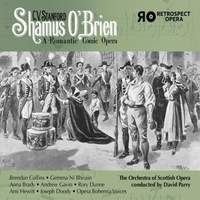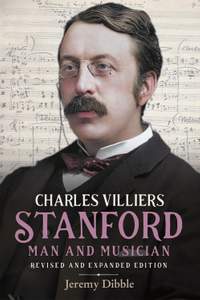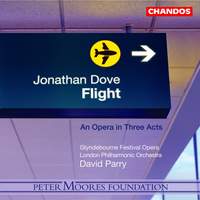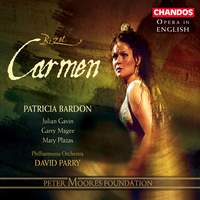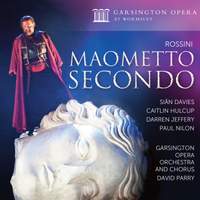Interview,
David Parry on Stanford's Shamus O'Brien
To mark the centenary of Stanford's death, the work received its world premiere recording this year courtesy of Retrospect Opera, with David Parry conducting a predominantly Irish cast headed by baritone Brendan Collins in the title-role; the results prompted Gramophone's Richard Bratby to wonder whether the piece might stake its claim to be 'the finest British opera between Sullivan and Smyth', whilst British Music Guide's Alan Cooper praised Stanford's 'finely structured and tellingly orchestrated melodies'.
I spoke to David Parry last month about the opera's curious blend of seriousness and frivolity, Stanford's later misgivings about the subject-matter, and his own surprise cameo on the recording...
When did you first become aware of Stanford as an opera-composer?
When Valerie Langfield at Retrospect Opera asked me to conduct this one! Part of the point of Retrospect Opera is to resurrect these British operas that have been completely forgotten and do deserve to be revived. When you think of some of the operas that are revived, you often think ‘Why that and not this?!’. There’s a good rationale behind Retrospect, and I was delighted to come on board.
I think I knew somewhere in the bottom of my mind from my university days that he’d written operas as well as the better-known things like Songs of the Fleet and the Magnificat and Nunc Dimittis in G. None of Stanford’s other operas have really survived, and this one isn’t part of the canon, but it was apparently extremely popular for the first twenty years of its life.
Why do you think Shamus was such a hit, albeit briefly?
I think one of the reasons was that it was actually very tuneful, and the numbers are extremely well written; there’s no coloratura or vocal fireworks, but he certainly knows how to use the voice. It’s in the post-Wagnerian tradition in that respect, basically syllabically written. The ensembles are good and tight, and the arias are catchy and memorable. And it’s somewhere between an opera and an operetta. The inclusion of dialogue makes it seem more like an operetta to our ears today, but of course German operas had dialogue before Wagner: serious operas like Fidelio, Der Freischütz and so on.
Why did it fall out of fashion? I think it’s partly just because so much music of that period generally fell off the radar, apart from the obvious masterpieces. (Take my namesake, Parry...He wrote some really good pieces and was an important composer: I listen to his music out of genuine enjoyment, not out of duty!) And secondly, I think the subject-matter is difficult – or rather it became difficult because of what happened in Ireland later on…the independence rebellion and the establishment of the Free State became a very serious matter and of course people were killed in Dublin in 1916. In the wake of so much violence and bloodshed, an opera about Irish independence became very difficult to stage.
And then there’s the issue of the libretto. The subject-matter is weighty, but the libretto is not entirely serious in tone – and unless you have Irish singers in the Irish roles (as we do here) it really would be embarrassing, but they managed to make it work by putting it into their natural rhythm of speech.
Stanford was exposed to Italian opera during his childhood in Dublin, and went on to study in Leipzig and Berlin - how much do you think those experiences fed into his own operatic writing?
I can say that he was entirely influenced by German opera rather than Italian opera; the ensembles in particular are very much in the post-Mozartian tradition. In those days, German music was regarded by the British as the only ‘serious’ music. When I was very young I remember that respected music-critics would say things like ‘Oh Verdi, he’s so vulgar!’ and I’m sure that the dominant thinking in the late nineteenth century was that Italian music was somehow superficial, without a real understanding of what the framework of those pieces actually was.
And do you hear much evidence of him drawing on traditional Irish music in Shamus?
Let's say it’s pretty subtle! Apart from when the piper comes in, which was fun. We had to plan the recording-sessions around his availability, and I think there was just one afternoon where he could come. It was quite splendid really, but staging this opera does depend on being able to fix a piper! The Wexford Festival could be the perfect place for it: they’re known for programming some pretty niche repertoire, and to have it performed in Ireland, by Irish people would be ideal.
The one English role in the cast (Captain Trevor) is beautifully differentiated from the others on the recording...
Our Englishman has a strangely Irish name (Joseph Doody), but a very English accent in reality – though he exaggerated the poshness for the recording, of course! And I had a little cameo of my own as the Police Sergeant: I did it in a slight South London accent and had enormous fun.
I’d done a spoken role on a recording once before: I played the guide who meets Micaëla and directs her through the mountains on Chandos’s English-language recording of Carmen. It saves a fee and it’s fun to do! And when we did La gazza ladra at Garsington I was the voice of the magpie – not only did I get to play the title-role but I actually got a review for it! ‘A raucous voice from the pit’, they called me!
How did you enjoy working at the Garsington Festival?
It certainly has its charms, but the semi-outdoor setting can be challenging: for example, doing the beginning of Don Giovanni against brilliant sunshine the suspension of disbelief becomes quite difficult. My recording of Rossini's Maometto Secondo was made live from the old Garsington: we had such great performers, and we did little patches with the orchestra for the beginning and end. The noise-reduction techniques available now are amazing: they can simply add little brackets and delete things, and the beauty is that it’s never permanent and the original thing is still there. In the old days when I started recording it was all tapes and razor-blades: one snip and it was gone forever!
In operatic terms, what else have you been up to this year?
I recently conducted the premiere of Jonathan Dove’s Marx in London! with Scottish Opera, and I’m hoping that production has a future: there are enormous sets involved, but we’re looking for opportunities to do it again. It was a real success with critics and audiences: the Saturday nights in Glasgow and Edinburgh were sold out, and for a new opera that’s quite unusual.
The audience were so enthusiastic and it’s a marvellous piece which really should be seen at English National Opera: Jonathan’s later works haven’t been performed at a major house in London, and that’s not right. Flight has had 41 productions since we premiered it at Glyndebourne, which makes it one of the most successful operas in the last thirty years – only Nixon in China or Akhnaten come close. Looking back and thinking I conducted the premiere of that is quite something.
Brendan Collins (Shamus O’Brien), Gemma Ni Bhriain/Anna Brady (Nora O’Brien), Rory Dunne (Father O’Flynn), Ami Hewitt (Kitty), Andrew Gavin (Mike Murphy), Joseph Doody (Captain Trevor), Catriona Clark (The Banshee), David Parry (Sergeant Cox), Jarlath Henderson (Uilleann pipes)
Orchestra of Scottish Opera, Opera Bohemia Voices, David Parry
Available Format: 2 CDs
Jeremy Dibble
Available Format: Book
Christopher Robson (Refugee), Claron McFadden (Controller), Richard Coxon (Bill), Mary Plazas (Tina), Nuala Willis (Older Woman), Ann Taylor (Stewardess), Garry Magee (Steward), Steven Page (Minskman), Anne Mason (Minskwoman), Richard Van Allen (Immigration Officer)
London Philharmonic Orchestra, David Parry
Available Formats: MP3, FLAC
Patricia Bardon (Carmen), Julian Gavin (Don José), Garry Magee (Escamillo), Mary Plazas (Micaëla), Toby Stafford-Allen (Moralès), Nicholas Garret (Zuniga)
Geoffrey Mitchell Choir, New London Children's Choir, Philharmonia Orchestra, David Parry
Available Formats: 2 CDs, MP3, FLAC
Paul Nilon (Erisso), Siân Davies (Anna), Darren Jeffery (Maometto, Sultan of the Turks), Caitlin Hulcup (Calbo), Christopher Diffey (Condulmierol), Richard Dowling (Selimo)
Garsington Opera Orchestra and Chorus, David Parry
Available Formats: 3 CDs, MP3, FLAC



